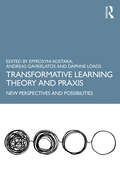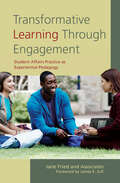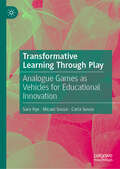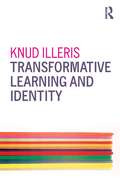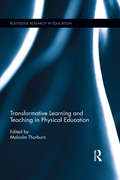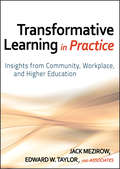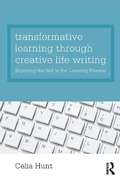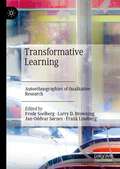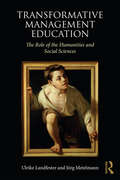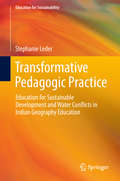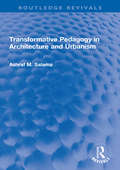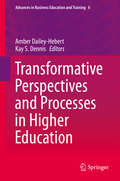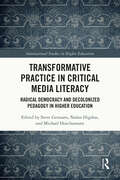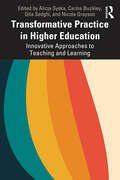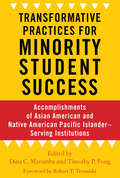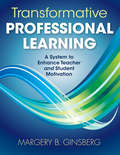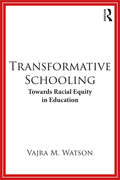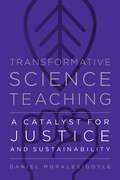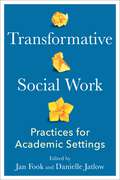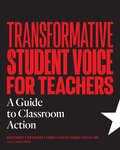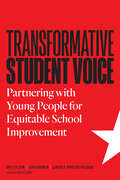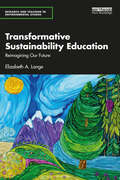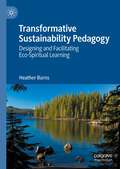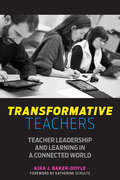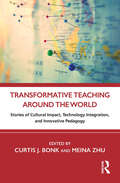- Table View
- List View
Transformative Learning Theory and Praxis: New Perspectives and Possibilities
by Effrosyni KostaraTransformative Learning Theory and Praxis examines the multi-faceted nature of transformative learning and transformation theory including its merits, restrictions, and possibilities, and presents carefully chosen international case studies and theoretical approaches that enrich the application of the theory within a wide variety of educational settings. By including new approaches to transformative learning theory, this book provides examples and teaching approaches coming from a variety of disciplines, including higher education, arts, classics, new technologies, and academic development. It bridges the gap between theory and practice to help teachers and adult educators embed potentially transformational techniques in the curriculum. Based on in-depth research, this key title provides a means of measuring and documenting transformative outcomes in qualitative studies of high impact learning experiences, and raises new questions and opportunities for the future development of the field. Transformative Learning Theory and Praxis is a must-read text for anyone interested in the research behind, and applications of, transformative learning and transformation theory, including researchers, students, and policy-makers in the field.
Transformative Learning Through Engagement: Student Affairs Practice as Experiential Pedagogy
by Jane FriedJane Fried’s overarching message is that higher education is based on a profoundly outdated industrial model of the purpose and delivery of learning and needs urgently to be changed. Student affairs professionals and academic faculty have become frustrated with the alienation of so many students from academic learning because they cannot see its connection to their lives. This book – addressed to everyone involved in helping college students learn – presents what we now know about the learning process, particularly those elements that promote behavioral change and the ability to place information in a broader context of personal meaning and long term impact. Central to its argument is that learning must be experiential and engage students holistically; that it must be grounded in brain science and an understanding of the cultural drivers of knowledge construction; that academic faculty and student affairs professionals must cooperate to help students make connections and see the implications of their learning for their lives; and that the entire learning environment needs to be integrated to reflect the organic nature of the process.A second purpose of this book is to enable student affairs professionals to articulate their own role in helping students learn. Student affairs, as a profession, has had difficulty describing its work with students as teaching because the dominant paradigm of teaching continues to suggest a classroom, an academic expert and a model of learning that is basically verbal and cognitive. Student affairs professionals who read this book will be able to understand and articulate the processes of experiential, transformative education to their academic colleagues and to help collegially design integrated learning experiences as partners with academic faculty. The book concludes with a number of brief invited chapters that describe a few emerging models and programs that illustrate Jane Fried’s vision of transformative learning experiences that integrate experience, study, and reflection.This book was written with contributions from: Craig AlimoJulie Beth ElkinsScott HazanElsa M. Núñez Vernon PercyChristopher PudlinskiSarah Stookey
Transformative Learning Through Play: Analogue Games as Vehicles for Educational Innovation
by Sara Rye Micael Sousa Carla SousaThis book explores analogue game-based learning in the context of the Anthropocene, addressing an urgent need for educational approaches beyond traditional scholastic boundaries. In the context of a complex world, the book emphasises the inadequacies of current educational methods and the potential of game-based learning to foster collective problem-solving skills. It then traces the historical roots of analogue and tangible games, highlighting their potential and challenges in alignment with several learning theories. The authors explore the psychology of analogue game-based learning, exploring its impact on cognition, motivation and, potentially, skill transfer to real life situations. They focus strongly on designing effective learning games, emphasising principles of game design, the TEGA initiative and common pitfalls to avoid. Ultimately, the book emphasises the importance of inclusivity in game-based learning, addressing barriers, intersectionality, and accessible design features both for commercial and educational games, and highlighting the ethical and pedagogical significance of fostering diverse and inclusive learning environments. The book will be of interest to researchers and students of education-related topics, particularly instructional design, pedagogical, and psychology, as well as enthusiasts from game studies and related practitioners.
Transformative Learning and Identity
by Knud IllerisIn the current ever changing world – the liquid modernity – the most pressing psychological challenge to all of us is to create and maintain a personal balance between mental stability and mental flexibility. In Transformative Learning and Identity Knud Illeris, one of the leading thinkers on the way people learn, explores, updates and re-defines the concept and understanding of transformative learning while linking the concept of transformative learning to the concept of identity. He thoroughly discusses what transformative learning is or could be in a broader learning theoretical perspective, including various concepts of learning by change, as opposed to learning by addition, and ends up with a new, short and distinct definition. He also explores and discusses the concept of identity and presents a general model depicting the complexity of identities today. Building on the work of Mezirow, various perspectives of transformative learning are analysed and discussed, including; transformative learning in different life ages; progressive and regressive transformations; motivation and identity defence; development of identity; personality and competence, and transformative learning in school, education, working life, and in relation to current and future life conditions. This vital new book by one of the leading learning theorists of our time will prove of lasting interest to academics, teachers, instructors, leaders and researchers in the field of adult learning and education. It will also appeal to many students and researchers of psychology and sociology in general. ?
Transformative Learning and Teaching in Physical Education (Routledge Research in Education)
by Malcolm ThorburnTransformative Learning and Teaching in Physical Education explores how learning and teaching in physical education might be improved and how it might become a meaningful component of young people’s lives. With its in-depth focus on physical education within contemporary schooling, the book presents a set of professional perspectives that are pivotal for realising high-quality learning and teaching for physical education. With contributions from a range of international academics, chapters critically engage with vital issues within contemporary physical education. These include examples of complex learning principles in action, which are discussed as a method for bettering our understanding of various learning and teaching endeavours, and which often challenge hierarchical and behaviourist notions of learning that have long held a strong foothold in physical education. Authors also engage with social-ecological theories in order to help probe the complex circumstances and tensions which many teachers face in their everyday work environments, where they witness first-hand the contrast between discourses which espouse transformational change and the realities of their routine institutional arrangements. This book enables readers to engage in a fuller way with transformative ideas and to consider their wider implications for contemporary physical education. Its set of professional perspectives will be of great interest to academics, policymakers, teacher educators and teachers in the fields of physical education, health and well-being. It will also be a useful resource for postgraduate students studying in these subject areas.
Transformative Learning in Practice
by Taylor Edward W. Jack MezirowThe leading authorities in the field produced this comprehensive resource, which provides strategies and methods for fostering Transformative Learning (TL) practice in a wide variety of higher and adult education settings. The book answers relevant questions such as: What are effective practices for promoting TL in the classroom? What is it about TL that is most helpful in informing practice? How does the teaching setting shape the practice of TL? What are the successes, strengths, and outcomes of fostering TL? What are the risks and challenges when practicing TL in the classroom?
Transformative Learning through Creative Life Writing: Exploring the self in the learning process
by Celia HuntArising from a research project conducted over two years, Transformative Learning through Creative Life Writing examines the effects of fictional autobiography on adult learners’ sense of self. Starting from a teaching and learning perspective, Hunt draws together ideas from psychodynamic psychotherapy, literary and learning theory, and work in the cognitive and neurosciences of the self and consciousness, to argue that creative life writing undertaken in a supportive learning environment, alongside opportunities for critical reflection, has the power to transform the way people think and learn. It does this by opening them up to a more embodied self-experience, which increases their awareness of the source of their thinking in bodily feeling and enables them to develop a more reflexive approach to learning. Hunt locates this work within recent developments in the influential field of transformative learning. She also identifies it as a form of therapeutic education arguing, contrary to those who say that this approach leads to a diminished sense of self, that it can help people to develop a stronger sense of agency, whether for writing or learning or relations with others. Topics covered include: Creative writing as a tool for personal and professional development The transformative benefits and challenges of creative writing as a therapeutic activity The relationships between literary structures and the processes of thinking and feeling The role of cognitive-emotional learning in adult education Collaborative learning and the role of the group This book will interest teachers in adult, further and higher education who wish to use creative life writing as a tool for learning, as well as health care professionals seeking art-based techniques for use in their practice. It will also prove useful to academics interested in the relationship between education and psychotherapy, and in the theory and practice of transformative learning. Additionally, it will appeal to writers seeking a deeper understanding of the creative process.
Transformative Learning: Autoethnographies of Qualitative Research
by Larry D. Browning Frode Soelberg Jan-Oddvar Sørnes Frank LindbergThis book contains a series of autoethnographies written by participants of a program on qualitative methods. It offers the stories of students-turned-professors and what they learned via autoethnographic writing as part of the course. The chapters provide insight into the application of a range of qualitative research techniques and, unlike typical works on qualitative methods, in a nonprescriptive method that reflects a personal learning process. This book will be of interest to students and academics engaged in qualitative research, as well as scholars of transformative learning, teaching pedagogy and broader educational studies.
Transformative Management Education: The Role of the Humanities and Social Sciences (Routledge Advances in Management and Business Studies)
by Ulrike Landfester Jörg MetelmannDue to the recent global financial crises, academic business schools have come in for much criticism, having, in the eyes of the public, failed in their responsibility to society by teaching future managers only how to increase their personal gain without any consideration as to their actions’ social and cultural consequences. Realising that there is a pressing need to innovate their educational offers accordingly, business schools are beginning to turn to the humanities and social sciences to improve on the understanding and thus the teaching of management. This book is the result of an empirical study conducted at eight academic business schools that either already practise or are beginning to practise linking management education to the humanities and social sciences. Gathered mostly in interviews our research team conducted during site visits to these schools, the material presented shows three major fields of concern: how to shift the focus from instrumental to transformative learning, how to reframe the concept of disciplinary subject matter towards a more relational understanding of knowledge—especially in the light of the impact digitalisation is having on education—and how to address the organisational, as well as the political consequences of management education turning towards the inclusion of the humanities and social sciences strategically. The findings indicate that the humanities and social sciences indeed offer knowledge which can significantly help management education with meeting the challenges of the twenty-first century. Innovating management education by making it part of its program portfolios proves a challenge in and of itself in the face of a university system which still determinedly clings to disciplinary segregation. Reforming management education towards an engagement with fields of knowledge traditionally at best ignored and at worst vilified as being completely useless in the "real world" may therefore place academic business schools at the forefront of a movement that is beginning to reshape the educational landscape as a whole. This book will be of value to researchers, academics and students in the fields of business, management studies, organisational studies and education studies.
Transformative Pedagogic Practice: Education for Sustainable Development and Water Conflicts in Indian Geography Education (Education for Sustainability)
by Stephanie LederThis book explores how the transnational Education for Sustainable Development (ESD) policy is being translated into formal school education in India. Stephanie Leder investigates the ESD’s transformative potential for pedagogic practice and builds a set of principles for how the global objectives of the ESD can be interpreted in diverse socio-cultural contexts. Her approach for transformative pedagogic practice emphasizes the promotion of a critical consciousness through argumentation skills. Using the case of water conflicts in geography education in India, the book reveals the contradictions between ESD objectives and curricula, syllabi, textbooks and classroom teaching at secondary schools in Pune, Maharashtra. Leder’s approach demonstrates how principles of schooling can be altered towards learner-centered, problem-posing and network-thinking teaching approaches to empower students towards reflective decision-making on the sustainable use of natural resources.
Transformative Pedagogy in Architecture and Urbanism (Routledge Revivals)
by Ashraf M. SalamaFirst published in 2009, Transformative Pedagogy in Architecture and Urbanism is a detailed round of pedagogical dialogue on architecture and urbanism that reset the stage for debating future visions of transformative pedagogy and its impact on design education. Structured in five chapters the book presents a wide range of innovative concepts and practical methodologies for teaching architectural and urban design. It traces the roots of architectural education and offers several contrasting ideas and strategies of design teaching practices. Transformative Pedagogy in Architecture and Urbanism will appeal to those with an interest in architectural and urban design, and architectural and design education.
Transformative Perspectives and Processes in Higher Education
by Amber Dailey-Hebert Kay S. DennisThis book aims to provide insight into the complexities confronting higher education today and to highlight tangible opportunities that exist to address such issues. We are in a constant state of flux and higher education needs to respond in more proactive, intentional and innovative ways to remain a relevant cornerstone to society and culture. The editors begin by asking how our collective reality might change if the complexity and uncertainty surrounding us were embraced and leveraged to serve the learner and society as a whole. They invite the reader to explore collaborative approaches to individualized learning pathways, networked learning and a reimagined ecosystem of academia. The chapters are arranged to inform the reader seeking knowledge on how to 1) reshape and redefine the 21st century university, with its evolving role in these transformative times; 2) design and implement courses that address the changing needs of the university and the non-traditional student; and 3) utilize research on innovative strategies with processes that promote organizational learning. The chapters profile the fluid nature of learning as it evolves in higher education and the workplace, often with a blurred line separating the two environments. Exciting ideas related to heutagogy, problem-based learning, innovative constructivist strategies, authentic learning and self-regulated learning all converge in this volume.
Transformative Practice in Critical Media Literacy: Radical Democracy and Decolonized Pedagogy in Higher Education (International Studies in Higher Education)
by Michael Hoechsmann Nolan Higdon Steve GennaroTransformative Practice in Critical Media Literacy brings together a diverse selection of essays to examine the knowledge production crisis in higher education and the role that news media and technology play in this process.This text highlights the importance of radical pedagogy and critical media literacy to fight back and reclaim higher education as the battleground for democracy and the embodiment of citizenship. Using a global and social justice lens, it explores the transformative potential of critical media literacy in higher education. It also provides real examples of current critical media literacy practices around the globe and of successful experiences inside classrooms. In an era of fake news, this text fulfils the yearning for critical media literacy to permeate higher education by drawing together practitioners and scholars speaking to journalism students, teacher candidates, and to students, scholars, and activists across a variety of spaces in higher education.This book will be a key resource for scholars, students, policymakers, community members and activists interested in education, politics, youth studies, critical theory, intersectionality, social justice and peace studies, activism, critical media literacy, communication, or media studies.
Transformative Practice in Higher Education: Innovative Approaches to Teaching and Learning
by Alicja Syska Carina Buckley Gita Sedghi Nicola GraysonThis insightful book transforms crisis reflections into longer term guidance for a responsive, engaged pedagogy within contemporary higher education (HE).In recent years, HE institutions worldwide have seen a seismic shift that has compelled them to rapidly transition to online and blended learning models. This book captures the ingenuity and resilience of educators who not only weathered the storm but emerged from it with innovative practices that have permanently transformed the landscape of teaching and learning in universities.Through interdisciplinary accounts and scholarly perspectives across diverse disciplines and geographies, it highlights care, creativity, and resilience in practices that build community, support learners, and foster engaged learning. Each chapter offers enduring lessons for learner-centred, responsive pedagogy, detailing innovations that practitioners permanently integrated across delivery formats.This key title is written for HE practitioners across the globe, whether they are teaching in the context of a subject discipline or identify themselves as blended or integrated professionals. Its insights will provide inspiration, guidance, and points for reflection for all those who wish to engage with critical pedagogies and long-term transformation in contemporary HE.
Transformative Practices for Minority Student Success: Accomplishments of Asian American and Native American Pacific Islander–Serving Institutions
by Dina C. Maramba, Timothy P. Fong, Robert T. TeranishiBetween 2000 and 2015 the Asian American Pacific Islander population grew from nearly 12 million to over 20 million--at 72% percent recording the fastest growth rate of any major ethnic and racial group in the US.This book, the first to focus wholly on Asian American and Native American Pacific Islander Institutions (AANAPISIs) and their students, offers a corrective to misconceptions about these populations and documents student services and leadership programs, innovative pedagogies, models of community engagement, and collaborations across academic and student affairs that have transformed student outcomes.The contributors stress the importance of disaggregating this population that is composed of over 40 ethnic groups that vary in immigrant histories, languages, religion, educational attainment levels, and socioeconomic status. This book recognizes there is a large population of underserved Asian American and Pacific Islander college students who, given their educational disparities, are in severe need of attention. The contributors describe effective practices that enable instructors to validate the array of students’ specific backgrounds and circumstances within the contexts of developing such skills as writing, leadership and cross-cultural communication for their class cohorts as a whole. They demonstrate that paying attention to the diversity of student experiences in the teaching environment enriches the learning for all. The timeliness of this volume is important because of the keen interest across the nation for creating equitable environments for our increasingly diverse students.This book serves as an important resource for predominantly white institutions who are admitting greater numbers of API and other underrepresented students. It also offers models for other minority serving institutions who face similar complexities of multiple national or ethnic groups within their populations, provides ideas and inspiration for the AANAPISI community, and guidance for institutions considering applying for AANAPISI status and funding. This book is for higher education administrators, faculty, researchers, student affairs practitioners, who can learn from AANAPISIs how to successfully engage and teach students with widely differing cultural backgrounds and educational circumstances.
Transformative Professional Learning: A System to Enhance Teacher and Student Motivation
by Dr Margery B. GinsbergMotivation is foundational to learning This book’s bold new vision for professional learning emphasizes the importance of intrinsic motivation and respect for cultural diversity. Knowing that culture and motivation are inseparable influences on learning, Margery B. Ginsberg provides practical steps for teaching and learning that are grounded in the reality of students' lives. The program’s processes include: Shadowing students to help sharpen teachers’ understanding of student motivation. Conducting home visits to better connect with students’ lives and families Collaborating with other teachers to design lessons Analyzing data in collaboration with students, families, and community members
Transformative Schooling: Towards Racial Equity in Education
by Vajra M. WatsonDiscussions of achievement gaps are commonplace in education reform, but they are rarely interrogated as a symptom of white supremacy. As an act of disruption, award-winning scholar Vajra Watson pierces through the rhetoric and provides a provocative analysis of the ways schools can become more racially inclusive. Her research is grounded in Oakland where longitudinal data demonstrated that Black families were sending their children to school, but the ideals of an oasis of learning were being met with the realities of racism, low expectations, and marginalization. As a response to this intergenerational crisis of miseducation, in 2010, the school district joined forces with community organizers, religious leaders, neighborhood elders, teachers, parents, and students to address institutionalized racism. Seven years later, Watson shares findings from her investigation into the school district’s journey towards justice. What she creates is a wholly original work, filled with penetrating portraits that illuminate the intense and intimate complexities of working towards racial equity in education. As a formidable case study, this research scrutinizes how to reconfigure organizational ecosystems as spaces that humanize, heal, and harmonize. Emerging from her scholarship is a bold, timely, and hopeful vision that paves the way for transformative schooling.
Transformative Science Teaching: A Catalyst for Justice and Sustainability
by Daniel Morales-DoyleA call to action championing equity and social justice in K–12 science curriculum
Transformative Social Work: Practices for Academic Settings
by Fook, Jan; Jatlow, DanielleTransformative approaches to social work have been popular for some time. Most discussions of this perspective, however, focus on actual practice with clients or service users, not educational contexts. In addition, there is often a lack of clarity about what “transformative” really means, both in theory and in practice.This book brings together a range of contributors to reconsider transformative social work, focusing on concrete examples in academic settings both inside and outside the classroom. They illustrate theories and practices of transformative social work in the academy in detail from different standpoints. Chapters by scholars at all career stages, students, staff, and managers consider all aspects of academic work—teaching and learning, research, and administration—as well as labor that academics perform outside the university. Authors describe their understanding of a transformative perspective as well as the practices that flow from this conception, providing rich detail on how a transformative approach can be implemented.This book stands out for the breadth of its focus, its international contributions, and its openness about the new challenges involved in doing transformative work today. It develops an expansive and systematic understanding of what “transformative” can mean across the entire academic and professional context of social work education.
Transformative Student Voice for Teachers: A Guide to Classroom Action
by Ben Kirshner Shelley Zion Carlos P Hipolito-Delgado Dane StickneyA step-by-step guidebook for teachers on how to build a classroom community that empowers students through critical reflection, inquiry, and action to drive school transformation
Transformative Student Voice: Partnering with Young People for Equitable School Improvement
by Ben Kirshner Shelley Zion Carlos P Hipolito-DelgadoA testament to the power of centering youth voices in planning and implementing school reform
Transformative Sustainability Education: Reimagining Our Future (Research and Teaching in Environmental Studies)
by Elizabeth A. LangeThis book lays out the principles and practices of transformative sustainability education using a relational way of thinking and being. Elizabeth A. Lange advocates for a new approach to environmental and sustainability education, that of rethinking the Western way of knowing and being and engendering a frank discussion about the societal elements that are generating climate, environmental, economic, and social issues. Highlighting the importance of Indigenous and life-giving cultures, the book covers educational theory, transformation stories of adult learners, social and economic critique, and visions of changemakers. Each chapter also has a strong pedagogical element, with entry points for learners and embodied practices and examples of taking action at micro/meso/macro levels woven throughout. Overall, this book enacts a relational approach to transformative sustainability education that draws from post humanist theory, process thought, relational ontology, decolonization theory, Indigenous philosophy, and a spirituality that builds a sense of sacred towards the living world. Written in an imaginative, storytelling manner, this book will be a great resource for formal and nonformal environmental and sustainability educators.
Transformative Sustainability Pedagogy: Designing and Facilitating Eco-Spiritual Learning
by Heather BurnsThis book offers stories and tools for designing and facilitating transformative sustainability pedagogy and explores how educators can intentionally design and facilitate eco-spiritual learning that promotes healing and wholeness. In these times of accelerating climate change and systemic injustice, we need learning spaces that both challenge our unsustainable dominant paradigms and support us in re-learning how to live in relational and regenerative ways. Rooted in the paradigm of interconnection and relationality, this book offers practical ways to design and facilitate learning toward more just, ecological, and spiritual ways of being. The author weaves together a variety of personal stories of teaching and learning, an exploration of how new science can be applied to transformative sustainability pedagogy, and eco-spiritual practices to help educators nurture wholeness and connection in themselves and in learning spaces.
Transformative Teachers: Teacher Leadership and Learning in a Connected World
by Kira J. Baker-DoyleTransformative Teachers offers an insightful look at the growing movement of civic-minded educators who are using twenty-first-century participatory practices and connected technologies to organize change from the ground up. Kira J. Baker-Doyle highlights the collaborative, grassroots tactics that activist teachers are implementing to transform their profession and pursue greater social justice and equity in education. The author provides a framework and practical suggestions for charting the path to transformative teacher leadership as well as suggestions for how others, including administrators and outside organizations, can support them. In addition, the book profiles fifteen transformative teachers who are changing the face of education, features three case studies of organizational allies (Edcamps, the Philadelphia Education Fund, and the Connected Learning Alliance), and includes insights from a wide range of educational leaders. A guide to the norms and practices of innovative educators, Transformative Teachers offers a clear and compelling vision of the potential for grassroots change in education.
Transformative Teaching Around the World: Stories of Cultural Impact, Technology Integration, and Innovative Pedagogy
by Curtis J. Bonk Meina ZhuTransformative Teaching Around the World compiles inspiring stories from Fulbright-awarded teachers whose instructional practices have impacted schools and communities globally. Whether thriving or struggling in their classrooms, instructing in person or online, or pushing for changes at high or low costs and risk levels, teachers devote intense energy and careful decision-making to their students and fellow staff. This book showcases an expansive variety of educational practices fostered across international contexts by real teachers: active and empowering learning strategies, critical thinking and creative problem-solving, cultural responsiveness and sustainability, humanistic integration of technology, and more. Pre- and in-service teachers, teacher educators, online/blended instructors, and other stakeholders will find a wealth of grounded, motivating approaches for transforming the lives of learners and their communities.
